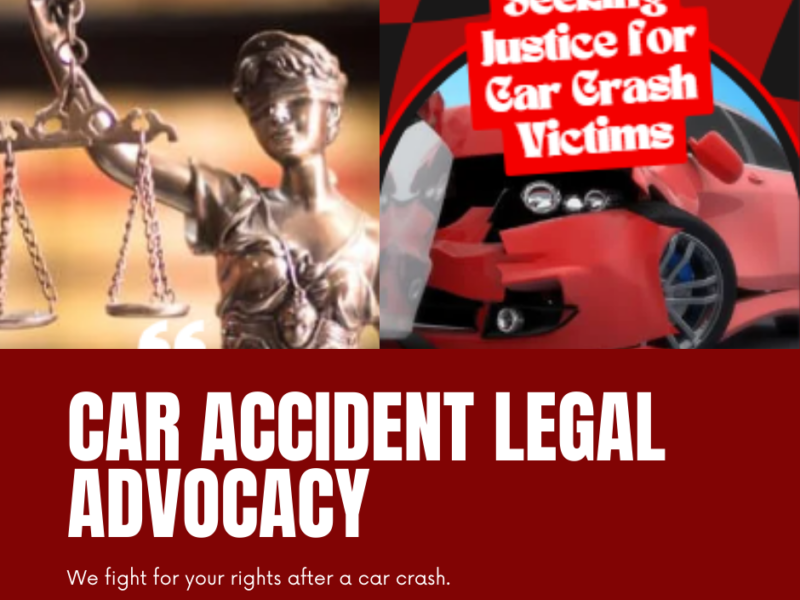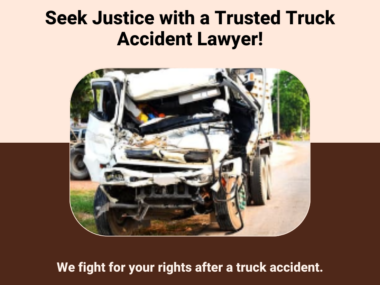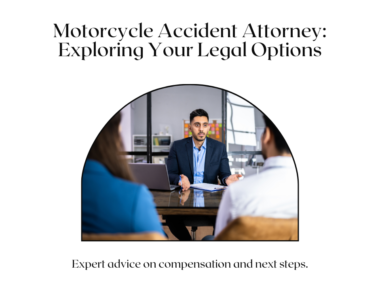Introduction
Car crashes are an unfortunate and often traumatic part of modern life, leading to severe injuries, significant property damage, and sometimes even fatalities. The aftermath of car crashes can be a daunting experience, with victims dealing with physical pain, emotional trauma, and financial strain. Navigating the legal complexities of a car crash claim is a task that requires specialized knowledge and an unwavering commitment to fighting for justice. This comprehensive guide sheds light on the pivotal role of a car crash law firm. It explores the various aspects they handle, all aimed at ensuring their clients receive fair compensation and justice.
The Impact of Car Crashes
Severity and Frequency
Car crashes are expected, with millions of incidents reported worldwide each year. The severity of these accidents can range from minor fender benders to catastrophic collisions. According to the National Highway Traffic Safety Administration (NHTSA), many car crashes result in serious injuries or fatalities. This underscores the critical need for effective legal representation, making this guide a valuable resource for those seeking fair compensation.
Common Causes of Car Crashes
Car crashes can result from numerous factors, including:
- Distracted Driving: Activities such as texting, using a GPS, or talking on the phone divert attention from the road, leading to accidents.
- Speeding: Exceeding speed limits reduces reaction time and increases the severity of collisions.
- Drunk Driving: Alcohol impairs judgment and coordination, significantly increasing the risk of accidents.
- Reckless Driving: Aggressive behaviors, such as tailgating or changing lanes abruptly, contribute to many crashes.
- Weather Conditions: Poor weather conditions, like rain, snow, or fog, can reduce visibility and road traction.
- Mechanical Failures: Issues such as brake failures or tire blowouts can lead to loss of vehicle control.
Legal Framework and Challenges
Proving Negligence
Establishing liability in a car crash case is a complex process that involves proving negligence. This necessitates demonstrating that the other party failed to exercise the level of care that a reasonable person would under similar circumstances, directly causing the accident and resulting in injuries. Critical steps in proving negligence include gathering evidence such as eyewitness testimonies, accident reconstruction reports, medical records, and other relevant documentation to support your claim. It’s also crucial to show that the other party had a duty of care, breached that duty, and that the breach directly led to injuries or damages. This is where the expertise of a car crash law firm becomes invaluable.
- Gathering Evidence: Collecting police reports, medical records, witness statements, and photographic evidence from the accident scene.
- Expert Testimony: Engaging experts in accident reconstruction to provide insights into the cause of the crash and establish fault.
- Analyzing Records: Reviewing driving records and any available surveillance footage to support the case.
Common Defendants
In a car crash case, liability can extend beyond the individual driver to include other parties such as the vehicle owner, the driver’s employer (if the driver was working at the time of the accident), the manufacturer of the vehicle or its parts (in cases of product defects), and even government entities responsible for road maintenance or design if their negligence contributed to the accident.
- Vehicle Owners: If the driver operated someone else’s vehicle, the owner might be liable under certain circumstances.
- Employers: The driver’s employer might be responsible if the crash involved a commercial vehicle.
- Vehicle Manufacturers: Defects in the car or its components can lead to manufacturer liability.
- Government Entities: Poor road design or maintenance can result in government liability.
Pursuing Justice: The Role of a Car Crash Law Firm
A car crash law firm is not just a legal entity but a compassionate partner in seeking justice for car accident victims and ensuring they receive the rightful compensation they deserve. Their crucial responsibilities encompass providing legal representation, gathering evidence, negotiating with insurance companies, filing legal claims, and advocating for their clients’ best interests in court if necessary. These firms are vital in guiding and supporting individuals through the complex legal process following a car accident, aiming to secure fair outcomes for their clients.
Comprehensive Case Evaluation
- Initial Consultation: Thoroughly comprehend the client’s account of the accident, carefully evaluate the potential strengths of the case, and engage in detailed discussions about the available legal options.
- Medical Evaluation: Certified medical professionals must thoroughly assess the client’s injuries to accurately document the full extent of their physical and psychological damage.
Evidence Gathering
- Meticulous Collection: Gathering all necessary evidence, including accident reports, witness statements, and surveillance footage.
- Expert Involvement: Engaging experts in accident reconstruction, vocational rehabilitation, and medical fields to build a compelling case.
Negotiating with Insurance Companies
- Insurance Claims: Handling communications with insurance companies to negotiate fair settlements. This includes interpreting policy details, proving liability, and calculating fair compensation for injuries, lost wages, and other damages.
- Settlement Offers: Evaluating settlement offers to ensure they cover all current and future medical expenses, loss of earnings, and other accident-related costs.
Litigation
- Court Representation: If a fair settlement cannot be reached, the lawyer will file a lawsuit and represent the client in court.
- Trial Preparation: Preparing for trial involves gathering and presenting evidence, examining witnesses, and making persuasive arguments to support the client’s claims.
Advocacy and Support
- Emotional and Legal Support: Providing clients compassionate and personalized legal support throughout the legal process.
- Ongoing Communication: Keeping clients informed about the progress of their cases and explaining complex legal terms and processes in understandable language.
Case Study: Navigating a Car Crash Claim
In a distressing incident, one of our clients was involved in a severe car crash on a bustling highway. The collision occurred because a driver was texting and failed to stop at a red light, resulting in our client sustaining multiple injuries, including broken bones and a traumatic brain injury.
Step-by-Step Legal Process
- Initial Consultation and Medical Care: The lawyer ensured the client received immediate and ongoing medical care, assessing the injuries’ severity.
- Evidence Collection: Comprehensive evidence, including the distracted driver’s phone records, accident scene photos, and witness statements, was meticulously gathered.
- Expert Analysis: Accident reconstruction experts were hired to demonstrate how distracted driving contributed to the crash.
- Insurance Negotiation: The lawyer negotiated with the at-fault driver’s insurance provider to cover medical expenses, rehabilitation costs, lost wages, and pain and suffering.
- Filing a Lawsuit: When the insurance company’s settlement offer was insufficient, the lawyer filed a lawsuit and represented the client in court.
- Trial: During the trial, the lawyer presented compelling evidence and expert testimony, resulting in a substantial verdict in favor of the client.
Challenges in Car Crash Claims
Insurance Company Tactics
Insurance companies frequently utilize various strategies to reduce payouts, including disputing liability, minimizing the seriousness of injuries, and providing swift yet insufficient settlements. A skilled attorney specializing in car crash cases is proficient in addressing these tactics and vigorously representing their client’s best interests.
Complex Liability Issues
Determining who is at fault in car accidents can be complex, especially when multiple parties are involved. An experienced lawyer with expertise in this area can effectively navigate these complexities, ensuring that all the responsible parties are appropriately held accountable for their actions.
Long-Term Implications
Car accidents can have devastating and lasting effects on the victims, leading to ongoing medical care and rehabilitation and significant impacts on their overall quality of life and ability to maintain employment. Attorneys must consider these long-term consequences when negotiating settlements or presenting cases in court.
Choosing the Right Car Crash Law Firm
When choosing a car crash law firm, it’s essential to carefully assess their experience in handling similar cases, their track record of successful outcomes, and their approach to providing comprehensive client care. Some key attributes to consider include the firm’s expertise in car accident litigation, its history of securing favorable settlements or verdicts for clients, its commitment to clear and responsive communication, and its ability to provide personalized attention to each client’s needs.
Experience and Expertise
- Track Record: A proven history of successful settlements and verdicts in car crash cases.
- Specialization: Expertise in handling car crash claims and understanding the intricacies of personal injury law.
Client-Centered Approach
- Compassionate Care: Delivering individualized care and assistance tailored to each client’s needs.
- Communication: ensuring clients are regularly updated and actively engaged in all legal proceedings.
Dedication and Advocacy
- Relentless Pursuit of Justice: Demonstrating a commitment to fighting for the rights of car crash victims.
- Comprehensive Legal Strategy: Employing a thorough and strategic approach to build a compelling case and achieve fair compensation.
The Financial Aspect: Maximizing Compensation
Car crash claims often involve significant financial compensation, covering various types of damages such as medical expenses, property damage, lost income, pain and suffering, and emotional distress.
Economic Damages
- Medical Expenses: Ensuring coverage for the accident’s present and anticipated medical expenses.
- Lost Wages: “Compensating for lost income resulting from the inability to work” can refer to receiving financial support or benefits when someone cannot work due to illness, injury, or other circumstances. This compensation may come from disability insurance, workers’ compensation, or government assistance programs. It is intended to provide financial assistance to individuals who cannot earn income because of their inability to work.
- Property Damage: Reimbursing the costs associated with repairing or replacing a vehicle due to damage or loss.
Non-Economic Damages
- Pain and Suffering: Compensating for physical pain and emotional distress.
- Loss of Consortium: Addressing the impact on relationships with loved ones.
Punitive Damages
In extreme negligence or intentional wrongdoing cases, punitive damages may be granted as a form of punishment for the responsible party and as a deterrent against similar behavior. These damages are intended to go beyond compensating the victim and serve as a means to discourage such actions from occurring again.
The Role of Technology and Innovation
Modern technology plays a crucial role in handling car crash claims. Lawyers utilize various tools and techniques, such as accident reconstruction software, digital mapping tools, vehicle data recorders, and forensic analysis, to gather and present evidence to strengthen their cases. These technological advancements help accurately determine the cause of the accident, identify responsible parties, and ensure fair settlements for the victims.
Accident Reconstruction Software
Advanced software can replicate an accident, offering a detailed visual depiction of the events leading up to and during the incident. This visual simulation can serve as highly persuasive evidence in a court of law, providing a clear and comprehensive understanding of how the accident transpired.
Electronic Logging Devices (ELDs)
Telematics devices capture various data about a vehicle’s performance and the driver’s behavior. This includes information on driving hours, speed, acceleration, braking patterns, and even location data. By carefully analyzing this data, insights into the vehicle’s operation and the driver’s conduct can be gained, which can be invaluable in determining liability and establishing negligence in the event of an accident or dispute.
Surveillance Footage and dashcams
Surveillance cameras and dashcams can capture video evidence essential for gaining insights into an accident. This evidence can play a significant role in proving liability and understanding the events leading up to the incident.
Medical Technology
Advanced medical imaging techniques and diagnostic tools, such as MRI, CT scans, and X-rays, can provide detailed documentation of the severity and extent of injuries sustained. This comprehensive documentation can significantly bolster the case for receiving fair and appropriate compensation for the injuries.
Preventative Measures and Advocacy
Car crash law firms go beyond representing clients and advocate for safer driving practices to prevent future accidents. This advocacy involves various initiatives, such as promoting awareness about the importance of safe driving, supporting the implementation of stricter traffic laws, and collaborating with local communities to educate drivers about the dangers of reckless behavior on the road. By taking proactive measures, these firms aim to reduce the occurrence of car crashes and enhance overall road safety for everyone.
Policy Advocacy
I am advocating for more stringent regulations and improved enforcement of current laws to bolster road safety for all motorists and pedestrians.
Public Awareness Campaigns
It is important to note that she is making significant efforts to raise public awareness about the perils of distracted driving, speeding, and other unsafe driving practices.
Collaboration with Safety Organizations
We are working in partnership with various dedicated organizations focused on advocating for and enhancing road safety. We are developing and implementing robust plans and projects to improve road safety.
Legal Issues and Common Concerns
Common Legal Terms Explained
Legal terminology can often be complex and challenging to grasp. To help you navigate the world of law, here are some commonly used legal terms, along with their explanations:
- Negligence: Negligence is the failure to exercise the care that a reasonably prudent person would exercise in similar circumstances, resulting in damage or injury to another party.
- Strict Liability: Strict liability is the concept of imposing liability for harm without requiring proof of negligence.
- Vicarious Liability: Legal responsibility of a third party for the actions of another, such as an employer for their employee.
- Comparative Negligence: A legal doctrine that reduces the plaintiff’s damages award by the percentage of their fault.
- Punitive Damages: Monetary compensation awarded to the plaintiff to punish the defendant for egregious behavior.
Frequently Asked Questions
- How Do I Choose a Car Crash Law Firm? Look for firms with a proven track record, client testimonials, and a client-centered approach. Check their experience in handling cases similar to yours.
- What Should I Do Immediately After a Car Crash? Seek medical attention, gather evidence, obtain witness statements, and contact a car crash lawyer as soon as possible.
- Can I sue for emotional distress? Yes, you can sue for emotional distress if you can prove that the car crash caused a significant psychological impact.
- What is the Statute of Limitations for Filing a Car Crash Claim? The statute of limitations varies by state but generally ranges from one to three years. Consult a lawyer promptly to ensure you meet this deadline.
- How Are Settlements Calculated? Settlements are calculated based on medical expenses, lost wages, property damage, pain and suffering, and other accident-related costs.
Case Study: The Process in Action
Consider the case of a client involved in a severe car crash on a busy highway in Jacksonville, FL. The accident was caused by a distracted texting driver who failed to stop at a red light. The client suffered multiple injuries, including broken bones and a traumatic brain injury.
Step-by-step legal process:
- Initial Consultation and Medical Care: The lawyer ensured that the client promptly received comprehensive and continuous medical attention, carefully evaluating the extent and seriousness of the injuries.
- Evidence Collection: The evidence collected was thorough and included detailed phone records of the distracted driver, photographs of the accident scene, and statements from multiple witnesses. This comprehensive approach ensured that all aspects of the situation were carefully documented.
- Expert Analysis: The legal team retained accident reconstruction experts to illustrate how the driver’s distraction significantly contributed to the collision.
- Insurance Negotiation: The lawyer discussed with the insurance company representing the driver responsible for the accident to secure compensation for medical bills, rehabilitation expenses, lost income, and damages for physical and emotional distress.
- Filing a Lawsuit: After the insurance company’s initial settlement offer was deemed inadequate, the lawyer took the necessary steps to file a lawsuit on behalf of the client. This action led the lawyer to represent the client in court proceedings to seek a fair resolution.
- Trial: During the trial, the lawyer skillfully presented compelling evidence, including detailed documentation, eyewitness accounts, and expert testimony from renowned professionals in the field. This comprehensive presentation of evidence and testimony ultimately swayed the jury, leading to a substantial and favorable verdict for the client.
Conclusion
Car crashes can drastically alter the lives of victims, leading to severe injuries, financial burdens, and emotional trauma. A car crash law firm is essential in navigating the legal complexities, advocating for justice, and ensuring victims receive the compensation they deserve. By understanding the causes, challenges, and legal processes involved in car crash claims, victims can make informed decisions and secure the reliable legal representation necessary to pursue justice and rebuild their lives.
If you or a loved one have been involved in a car crash, it is crucial not to delay seeking professional legal assistance. A specialized car crash law firm can offer the knowledge, guidance, and unwavering representation required to ensure fair compensation and seek justice for the physical, emotional, and financial damages incurred due to the accident.






1 comment